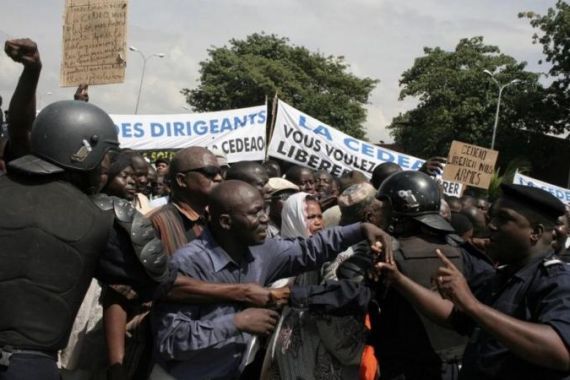African and EU leaders to hold Mali summit
ECOWAS and European leaders to meet in Bamako to make plans for foreign military intervention in Islamist-held north.

African and European leaders will meet in Bamako to work on plans for a military intervention to seize back Mali’s desert north from armed Islamist groups who control the region.
Friday’s summit comes a week after the United Nations Security Council passed a resolution asking West African nations to speed up preparations for the intervention, giving them 45 days to lay out detailed plans.
Rebels from the al-Qaeda-allied group Ansar Dine (Defenders of the Faith) on Thursday used pickaxes and other tools to destroy Muslim saints’ tombs in the ancient city of Timbuktu, their latest attack on its cultural treasures.
Since seizing control of Mali’s north in the chaos following a March coup, several Islamist groups have imposed a strict interpretation of sharia law. They have arrested unveiled women, stoned an unmarried couple to death and amputated the limbs of suspected thieves, according to residents and rights groups.
The global community has been in talks to intervene, with the Economic Community of West African States (ECOWAS) saying it has 3,000 troops on standby for the purpose.
Among those expected at the meeting on Friday are Nkosazana Dlamini-Zuma, the new African Union commission chief, Nigerian President Goodluck Jonathan and Dioncounda Traore, Mali’s interim president.
The number-two EU diplomat Pierre Vimont, France’s envoy to the Sahel Jean Felix-Paganon, and UN Secretary General Ban Ki-moon’s special envoy for the region, former Italian prime minister Romano Prodi, will also take part.
Strategy talks
Representatives from ECOWAS countries, the only ones expected to send troops to Mali, will begin laying out their strategy for the intervention.
They will set out their military needs and take note of what ammunition and ground troops Mali has available, according to Western diplomatic sources.
“We need to know where we’re going with this,” one diplomatic source said.
“It has to be very well thought-out, otherwise the Security Council won’t be on board if it deems the plan to be flawed,” the source added.
On Thursday, Guinea said it was ready to deliver to Mali weapons purchased by the regime of president Amadou Toumani Toure before he was overthrown in March.
ECOWAS has blocked delivery since late July. Guinea said it wanted to make sure the weapons fell into the right hands in Mali.
Underlining the importance of the meeting, Malian presidential adviser Moussa Diakite told the AFP news agency “it will be for us, Malians, and for our partners from the international community an opportunity to agree upon a plan to kick out the terrorists”.
Increasing pressure
Also expected to be involved “in one way or another” according to his entourage is Captain Amadou Haya Sanogo, the leader of the March 22 coup. The instability that coup caused allowed the Islamists to seize the north. He said last month that he backed the country’s efforts to reclaim the region.
Alongside details of the military intervention, the meeting’s attendees will also discuss the option of negotiating with some of the armed groups occupying the north.
“What we don’t want is to hold dialogue with the people who have shown themselves capable of carrying out amputations” and the other actions committed in the name of sharia law, a French source said.
“Negotiations are under way, but he who wants peace has to prepare for war,” a Bamako-based African diplomat added.
The negotiations are currently being conducted mainly with Ansar Dine, the group behind the Timbuktu destruction.
With witnesses saying on Wednesday that the armed Islamists were becoming “more and more barbarian”, the meeting comes amid increasing pressure to wrest back control of the north.